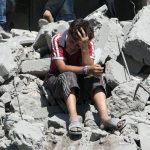This post originally appeared on Syria Deeply.
Political wrangling in the lead up to Friday’s U.N.-brokered peace talks has dramatically lowered expectations. But continued inaction at the diplomatic level, writes Elise Baker of Physicians for Human Rights, is a “death sentence” for many Syrians trapped in besieged or remote areas across the country
As world leaders gather in Geneva for the latest round of talks on the Syrian conflict, I can’t help recalling what a Syrian doctor told me a few months ago in Gaziantep, Türkiye.
“Nobody wants to end the conflict in Syria,” he said. “They want to run the conflict in Syria, but not to end it… If I could say something, I would say stop it all. But the world will not listen.”
I find it hard to be optimistic about these talks. While all parties to the negotiations agree in principle on the need for a ceasefire, they have not been willing to make the necessary concessions to achieve one. In the interim, dozens of civilians are killed each day as Russia and Syria increase their assault on opposition-controlled areas. Hospitals, schools and markets are destroyed. Entire towns and cities are demolished. And hundreds of Syrians are forced to flee with their children and few belongings to yet another town, where they will live in yet another abandoned building before it, too, is bombed and they are forced to flee again.
All parties agree on the need for unhindered humanitarian access to those in need, but one million Syrians continue to live under siege. They go to bed hungry, and outbreaks of flesh-eating diseases go untreated. They hope their children will survive living off one bowl of rice every other day for months on end. But hundreds have not been so lucky. They have starved to death in towns only miles away from food-filled warehouses, where aid sits ready to be delivered. The U.N. says it must deliver aid to all Syrians in need, and the Security Council has authorized U.N. agencies to do so without approval from the Syrian government. Yet these U.N. agencies continue to request permission for such deliveries from the Syrian government, which time after time has ignored or rejected these requests.
Despite the fact that all parties have agreed, in principle, on the need to combat the self-declared Islamic State (ISIS), its members continue to terrorize, imprison, rape, execute, threaten and abuse entire populations. They parade their antics on the Internet for the world to witness and decry. Then they feed off this publicity, garnering more followers who will commit even more atrocities. The United States has spent 18 months and more than $5 billion bombing ISIS, yet the group controls more territory in Syria than it did 18 months ago. Meanwhile, Russia continues to bomb opposition-controlled areas under the pretense that it is fighting terrorism.
As world leaders gather to negotiate ceasefires, humanitarian aid and fighting ISIS, I worry that they have grown too numb to the everyday reality Syrians are forced to live through. I worry that anyone who works on Syria has become inured to this horrifying conflict – the loss of hundreds of thousands of lives to barrel bombs and indiscriminate shelling, to car bombs, starvation and beheadings. But mostly I worry that the politics of stalemate and inaction, which have repeatedly prevented a resolution to the conflict, will stall these peace talks.
I hope these leaders recall the past five years of the Syrian conflict and internalize the incredibly high cost of inaction. I hope negotiators keep in mind the millions of lives that hang in the balance. Millions of Syrians – individuals with families and friends, hopes and careers – could be saved from their current fate of displacement and death if the talks succeed. Millions of Syrians’ lives depend on these talks.
I hope these leaders act with urgency on the principles they tout. If these talks do not succeed, who knows how many more Syrians will be lost to bombs, starvation, and denial of health care? How many millions of refugees will risk their lives seeking safety in an increasingly unwelcoming Europe? How many more agonizing years will Syrians have to endure before politicians again summon the political will to resolve this brutal conflict?
As world leaders gather in Geneva, I hope they understand that for the Syrians who suffer from their inaction, failure of these talks is a death sentence.

